The Seven Gifts in Divine Revelation:
The revealed doctrine of the gifts of the Holy Ghost is found mainly in the prophet Isaias. In announcing the coming of the Messias, he declares:
“The Spirit of the Lord shall rest upon him: the spirit of wisdom and of understanding, the spirit of counsel and of fortitude, the spirit of knowledge, and of godliness.”
The Seven Gifts in Tradition:
According to the Early Fathers, this text of Isaiah is applied first to the Messiah, and then to all the just by participation (and to whom Christ promised to send the Holy Ghost). Since by Baptism we are incorporated into Christ, we share in these same gifts.
According to Tradition, there are seven in number. Over time, the Fathers often commented on these words of Scripture, and tradition has explicitly affirmed that the seven gifts of the Holy Ghost are in all the just.
The Gifts According to St. Thomas Aquinas:
St. Thomas tells us that the gifts are:
Habitual, permanent dispositions specifically distinct from the virtues
Necessary to salvation
Connected with charity and grow with it.
The gifts of the Holy Ghost are not acts, actual motions, or passing helps of grace, but are qualities, or permanent infused dispositions.
The gifts are passive in regard to the Holy Ghost, so that we may act under His influence. Each gift perfects a part of our intellect or will.
There are four intellectual gifts which enlighten the mind:
understanding (to penetrate the truth) → perfects hope
wisdom (to judge divine things) → perfects charity
knowledge (to judge created things) → perfects faith
counsel (to judge our actions) → perfects prudence
There are three active gifts which strengthen the will:
piety (worship due to God) → perfects religion
fortitude (enables us to act & endure) → perfects fortitude
fear of the Lord → (filial respect & fear of displeasing God) → perfects temperance
The following chart was made by Fr. Reginald Garrigou-Lagrange, O.P. to explain how the gifts perfect each corresponding virtue. It was extracted from his work The Three Ages of the Interior Life, Volume 1:
And here is a simplified chart that I made:
*A small note: Fr. Lagrange says that understanding perfects faith and knowledge perfects hope, but Fr. Tanquerey says that knowledge perfects faith and understanding perfects hope. My chart is based on Tanquerey’s explanation, which is why it differs from Lagrange’s.
If you are in a state of grace, you have the gifts.
We receive the gifts of the Holy Ghost at the same time that we receive the state of grace. They are merely supernatural faculties. When we come to the age of reason and our heart turns towards God, we begin, under the influence of actual grace, to use our whole supernatural organism, including the gifts of the Holy Ghost. Docility to the Holy Ghost demands certain conditions, but nevertheless, the Holy Ghost dwells in every soul that is in a state of grace. This is eternal life in us and is the most precious thing in us.
Definition of the Gifts:
The gifts of the Holy Ghost are supernatural habits which impart docility to our faculties, so they can promptly comply with the inspirations of grace.
Tanquerey says that the gifts are sources of suppleness and energy, of docility and power, which render the soul passive under the Hand of God, and at the same time active in His service
This docility to the inspirations of the Holy Ghost is a receptivity, which needs to be cultivated to attain its full development. It can only be exercised when God gives actual grace, which is sometimes called operating grace. Then the soul, while passive under the action of God, is active in accomplishing His Will.
In other words, actual grace is necessary to exercise the virtues and the gifts.
Summary So Far:
The Holy Ghost dwells in our soul and infuses habitual grace and supernatural habits.
These habits perfect our faculties and enable them to perform supernatural acts under the impulse of actual grace.
These habits are the virtues and the gifts.
What is the difference between the Gifts and the Virtues?
The fundamental difference comes from the different way in which they act in the soul. Aquinas tells us that God may act in us in two ways:
1. Virtues → In the case of the virtues, God accommodating Himself to the human mode of action. He helps us reflect and seek the best means to reach our end. In order to supernaturalize these operations, He gives us actual graces, but He leaves us free to take the initiative. It is therefore we who act under the impulse of grace.
2. Gifts → By means of the gifts, God acts in a supra-human way. He Himself takes the initiative. Before we have had the time to reflect, He sends us divine intuitions, lights and inspirations which act in us, without deliberation on our part, but never without our consent.
This grace, which invites and obtains our consent, is operating grace. Under its influence we are passive rather than active. It is called operating grace because it operates in us without deliberation on our part, but not, however, without our free consent. An example of an operating grace would be a person who is absorbed in work, and suddenly has an unexpected, special inspiration to say a short prayer, and he immediately does so. It requires, on our part, active fidelity to the actual grace of the present moment.
Our activity consists in freely consenting to the operation of God, in allowing ourselves to be led by the Holy Ghost, and in promptly and generously following His inspirations.
The virtues → incline us to act in accordance with the nature of our faculties. With the help of the grace we receive, inquire, reason and work just as we do in actions of a purely natural order. The virtues are therefore energies that are primarily and directly active.
The gifts → impart to us a docility and a receptiveness that enable us to receive and follow the motions of operating grace. This grace moves our faculties to act, without taking away their liberty, so that the soul is more passive than active.
Here is an illustration of how virtue is like a man rowing a boat, while the gifts are like a wind blowing a sail. Our vessel advances not just by the effort of our own rowing, but much more rapidly and with less effort by way of a supernatural wind.
The Excellence of the Gifts:
The gifts place us under the direct action of the Holy Ghost, Who, living in our soul, enlightens our mind with His lights, points out clearly what we must do, enkindles our heart, and strengthens our will to make us accomplish the good suggested. This union is as close as it can be in this life. The more united and docile we are to the Holy Ghost, the source of all sanctity, the holier we are.
Holiness, then, could be measured by one’s union and docility to the inspirations of the Holy Ghost.
The Effects of the Gifts:
The effects are priceless. The gifts cause us to practice the highest degree of the moral and theological virtues, and the same gifts inspire heroic acts. It is through them that, when God so wills it, the soul is raised to contemplation, the suppleness and docility they produce being the immediate disposition required for the mystic state.
This is the shortest way to the highest perfection.
Cultivation of the Gifts:
Yet, it still remains that in order for the gifts to attain their complete development, we must have practiced the moral virtues for a notable period of time.
It is, in fact, the moral virtues that little by little make the soul tractable and dispose it to enjoy that perfect docility required for the full exercise of the gifts.
Therefore, the practice of the moral virtues is the first requisite condition for the cultivation of the gifts.
St. Thomas Aquinas put it this way:
“The moral and intellectual virtues precede the gifts, since man, through being well subordinate to his own reason, is disposed to be rightly subordinate to God.”
To acquire divine docility which the gifts confer, one must have previously conquered one’s passions and vices and formed the virtuous habits of prudence, humility, obedience, meekness, chastity, etc. How can one discern, accept and follow with docility the inspirations of grace when the soul is troubled by pride, anger, and lust?
Fr. Thomas Cajetan, O.P., a great commenter on the works of Aquinas, says:
“Let spiritual directors note this and let them see to it that their disciples are, first of all, exercised in the active life before proposing to them the heights of contemplation. One must tame one’s passions by habits of meekness, patience, humility, etc., in order to be able, once the passions have been dominated, to rise to the contemplative life.”
*If you’ve been reading my articles for a while, then this should ring a bell. The Spiritual Life progresses through a series of three predictable phases (or stages, or ages, or ways), the first of which is aptly called The Beginner, or The Purgative Way. You simply cannot progress to higher stages of the spiritual life (aka, closer union with God) until you have purged sin from your life and actively cultivated virtue. It’s the first, rudimentary step in the spiritual life.
Other ways to Cultivate the Gifts:
Combat the spirit of the world, which is diametrically opposed to the Spirit of God. St. Paul tells us: “We have received not the spirit of this world, but the Spirit that is of God ... But the sensual man perceiveth not these things that are of the Spirit of God; for it is foolishness to him, and he cannot understand, because it is spiritually examined. ” To combat this spirit of the world, we must read and meditate upon the Gospel maxims, living according to them as perfectly as possible. Then we shall be prepared to yield ourselves to the guidance of the Holy Ghost.
Interior recollection: the habit of frequently thinking of God, living not only near us but in us. In this way, one gradually comes to the point of never losing sight of God’s presence.
Follow promptly and generously all of of His inspirations. Otherwise, He would cease to speak. Never deliberately resist His inspirations; for the more docile one is, the more will He be pleased to act on the soul.
Go to meet Him through prayer: The Church, in her liturgy, places at our disposal magnificent prayers for drawing unto ourselves the Spirit of God, such as the sequence, Veni Sancte Spiritus.
Below will cover the three active gifts and one intellectual gift (counsel). I will cover the other three intellectual gifts in another post.
I. The Gift of Counsel
Counsel → Prudence
The gift of counsel perfects the virtue of prudence by making us judge promptly and rightly, by supernatural intuition, what must be done, especially in difficult cases.
By the virtue of prudence: we reflect and carefully seek out the best means of attaining a certain end, profiting by the lessons of the past and putting to use our present knowledge, in order to reach a wise decision.
With the gift of counsel: the Holy Ghost speaks to our heart and in an instant makes us understand what we must do.
The Object of Counsel
The object of the gift of counsel is the right ordering of particular acts.
The gifts of knowledge and understanding furnish us with the general principles, but the gift of counsel enables us to apply these to the thousands of particular cases which present themselves.
The light of the Holy Ghost shows us what must be done at that time, in that place, and for that circumstance, and, if we are directing others, what advice to give them.
The Necessity of Counsel
Counsel is necessary to all in important and difficult situations in which salvation or sanctification are concerned, in matters of vocation, when encountering occasions of sin, and even in the discharge of duty.
Human reason is fallible and uncertain, and proceeds slowly with caution; it is of importance to receive, in the decisive moments of our life, the lights of the Divine Counsellor, Who, with a single glance, takes in all, and Who, at the opportune moment, makes us see with certainty what we must do in difficult circumstances.
“With the gift of counsel, the soul is able to discern the means; it sees its way; it goes along with assurance, be the way steep, deserted and forbidding... and it knows how to wait for the acceptable time. ” - Mgr. Landrieux.
Cultivating the Gift of Counsel
The cultivation of this gift requires a deep sense of our weakness and frequent recourse to the Holy Ghost, so that He may teach us His ways.
He will not fail to come to enlighten us in one way or another, for He stoops down to the humble; and He will not fail us, if we take care to ask His help in the morning for the entire day, at the beginning of our actions, and in all difficult cases.
The other way to cultivate the gift of counsel is to accustom ourselves to listen to the voice of the Holy Ghost.
We must judge all things by His light without allowing ourselves to be influenced by human considerations, and to follow His inspirations.
Finding our soul open and docile, He will speak to the heart more frequently.
Summary
The gift of counsel perfects the virtue of prudence.
It rightly orders our actions in all circumstances, showing us what to do in each particular circumstance, time, and place.
It is necessary to eliminate the indecision of our faulty and limited human reason; it enables us to see with certainty what we must do.
With this gift, we can discern the means we need to take; the way we must go, and we can go with assurance, even when it is difficult.
To cultivate this gift, we must be humble, docile, teachable, and be open to listening & obeying.
II. The Gift of Piety
Piety → Religion
The gift of piety perfects the virtue of religion by producing in our hearts a filial affection for God, and a tender devotion towards persons and things consecrated to Him, in order to make us fulfil our religious duties with a holy joy.
The virtue of religion is acquired through effort, while the gift of piety is communicated to us by the Holy Ghost.
The gift of piety makes us see in God the best and most loving Father. It fills the soul with confidence and love, without endangering the reverence due to God.
The gift of piety fosters three things:
Filial respect: A filial respect towards God makes us adore Him with a holy joy as our beloved Father. Then our spiritual exercises, instead of being an arduous task, become a need of the soul, a longing of the heart for God.
Sacrificial Love for God’s Glory: a generous and tender love that leads us to sacrifice self for God and God's glory, in order to please Him. It is not a selfish piety which seeks consolation, not an inert piety which remains inactive when it should act, nor a sentimental piety which but looks for emotional satisfaction; but it is a virile piety, which expresses its love by complying with the Will of God.
Abandonment to the Divine Will: an affectionate obedience which sees in the commandments and in the counsels the wise and paternal expression of the Divine Will in our regard. This results in a holy abandonment into the hands of this loving Father, Who knows far better than we do what is good for us and Who tests us only to purify us and unite us to Himself.
The gift of piety also makes us love persons and things which have a participation in the Divine Being and in His perfections. Thus, we love and revere: The Mother of God; The Angels & Saints; Holy Scripture; Holy Church; the Sovereign Pontiff; our superiors.
The Necessity of Piety
All Christians need this gift if they are to fulfil, joyfully and readily, their duties of religion towards God, and of respectful obedience towards their superiors. Without it they will act towards God as towards a master, prayer will be a burden rather than a comfort, and God’s providential trials will appear as severe or even unjust punishments.
This gift is even more necessary to priests, to religious, and to all who strive to live a perfect life in the world. Without it, spiritual exercises would soon become an intolerable burden; for no one can abide long in the thought of God unless he loves Him.
It is the gift of piety which, united to charity, infuses into the soul sentiments of filial tenderness towards God, which transform our exercises of piety into sweet communion with Our Heavenly Father.
Cultivating the Gift of Piety:
Frequently meditate upon the parts of Holy Scripture which portray the goodness and paternal mercy of God towards men and the just.
Transform ordinary actions into acts of religion, doing them in order to please Our Father Who is in Heaven. In this way, our entire life becomes a prayer, an act of filial piety towards God.
III. The Gift of Fortitude
Fortitude → Fortitude
The gift of fortitude perfects the virtue of fortitude, by giving the will an impulse and energy which enables it to do great things joyfully and fearlessly, despite all obstacles.
The gift of fortitude and the virtue of fortitude do not differ in the outcome of our efforts, but of the action of the Holy Ghost.
The virtue of fortitude does not relieve us of hesitancy, of apprehension in regard to obstacles or failures.
The gift of fortitude, on the other hand, brings with it determination, assurance, joy, the certain hope of success, and thus effects greater results.
The gift of fortitude leads us to act and to endure, even in the most arduous difficulties, and at the price of heroic effort.
To act is to undertake, without hesitation or fear, the most arduous tasks.
For example, to practice perfect recollection in the midst of tireless activity; to remain humble when surrounded by honors; to face dangers, weariness, labors, and death itself; to trample under foot human respect.
No less strength is required to endure long and painful maladies, or moral sufferings such as are endured by the soul in passive trials; or to observe faithfully throughout life all the prescriptions of a rule.
Martyrdom is considered the highest act of this gift, since it is a surrender to God of our most cherished possession: our life.
Yet, to shed one’s blood drop by drop by spending life completely for the sake of other souls, as so many priests and devout laymen do, constitutes a martyrdom hardly less meritorious, and is within the reach of all.
The Necessity of Fortitude
We must do the heroic in order to preserve the state of grace, and it is precisely this gift of fortitude that enables us to. This gift is also necessary in the discharge of our duties.
Cultivating Fortitude
Since our strength is not from ourselves, but from God, we must look for it in Him by humbly acknowledging our weakness. Providence makes use of the weakest instruments, but only if they are conscious of their own weakness and rely upon Him, Who alone is able to make them strong.
It is principally in the reception of the Holy Eucharist that we can seek from Jesus the strength we need in order to overcome all obstacles.
Carefully use the thousands of circumstances of our daily life to exercise fortitude and patience:
from morning to night submit joyfully to a rule.
strive to be attentive at your prayers.
keep silence when you feel inclined to speak.
avoid the sight of such objects as excite curiosity.
suffer the weather without complaint.
show kindness to those you don’t like.
accept reproaches humbly and patiently.
accommodate to the tastes and desires of others.
stand contradiction without irritation.
vanquish your passions and conquer yourself.
To do all this, not once in passing, but habitually - to do so not merely patiently, but also joyfully - this is already heroic virtue, and when later on, more serious circumstances present themselves, heroic action will not be difficult, for we shall have the strength of the Holy Ghost Himself.
IV. The Gift of Fear
Fear → Hope & Temperance
The gift of fear perfects the virtues of hope and temperance.
Fear perfects hope by inspiring us with a fear of displeasing God and being separated from Him. It perfects temperance by detaching us from the things that could cause that separation.
It inclines our will to:
a filial respect for God,
remove sin from our life, which is displeasing to Him,
hope in the power of His help.
It is comprised of three principal acts:
a vivid sense of God’s greatness,
a lively sorrow for the least faults committed,
a vigilant care in avoiding occasions of sin
The Necessity of Fortitude
The gift of fear is necessary to avoid an excessive familiarity with God. Some are tempted to forget God’s greatness and the infinite distance that separates us from Him, having towards Him and holy things an unbecoming familiarity, & treating Him as an equal.
The Cultivation of Fear
Frequently meditate upon God’s infinite grandeur, His attributes, His sovereignty.
Reflect upon the nature of sin, which, no matter how slight, constitutes an offence against the infinite Majesty of God. We cannot help conceiving a reverential fear of Our Sovereign Master, Whom we continually offend, and when we come into His presence, it is with a humbled and contrite heart: “A contrite and humbled heart, O God, thou wilt not despise.”







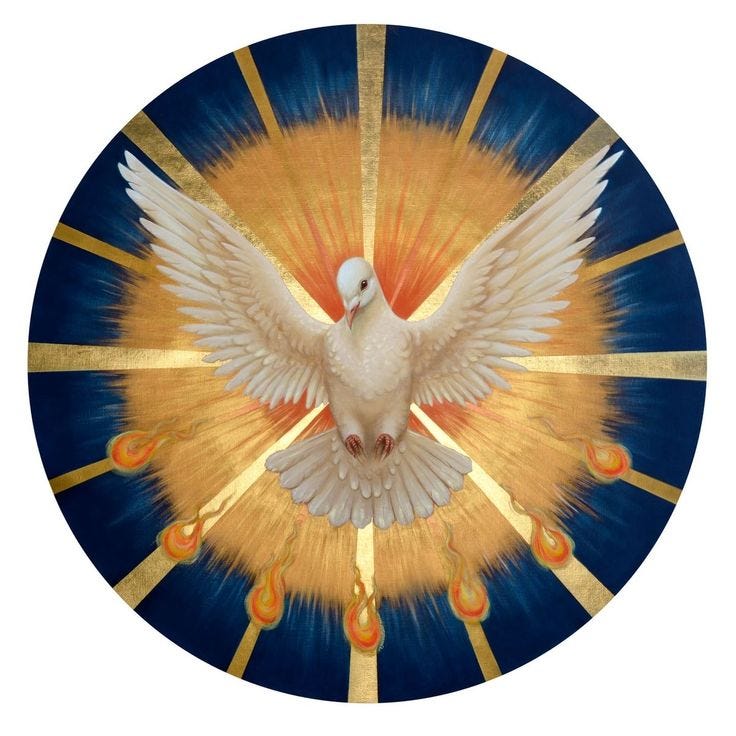
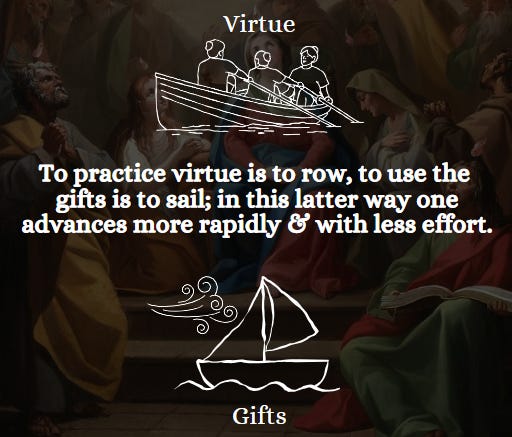

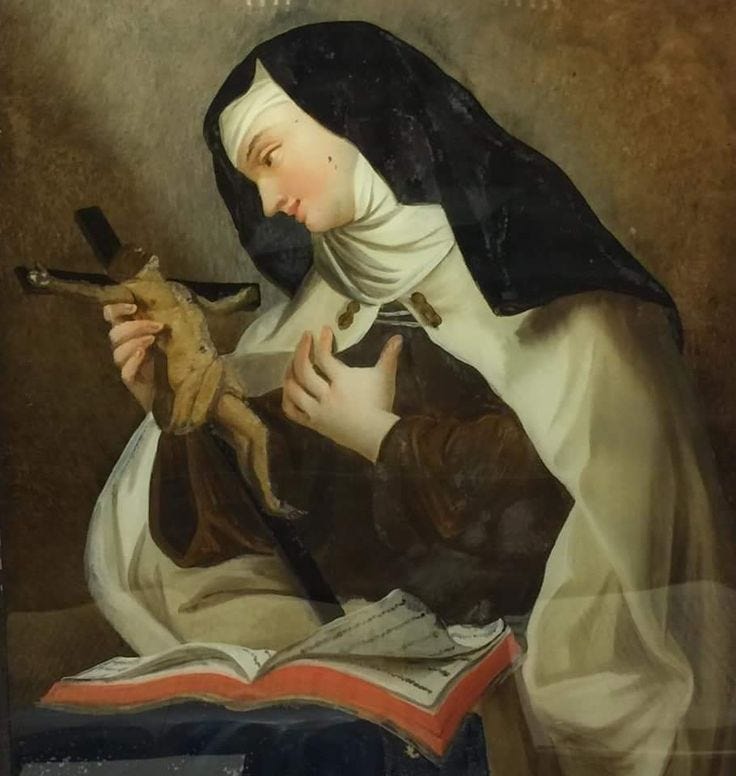
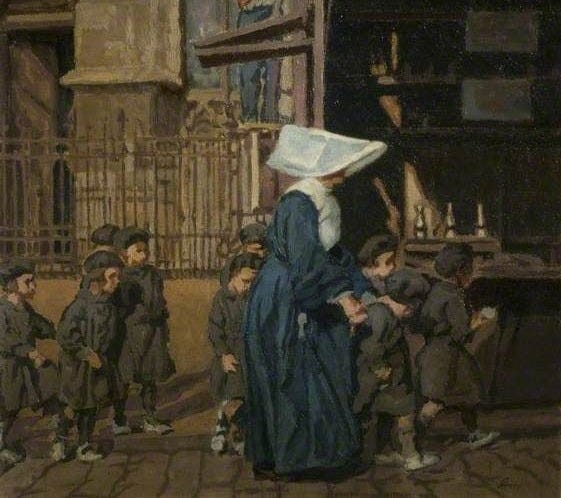
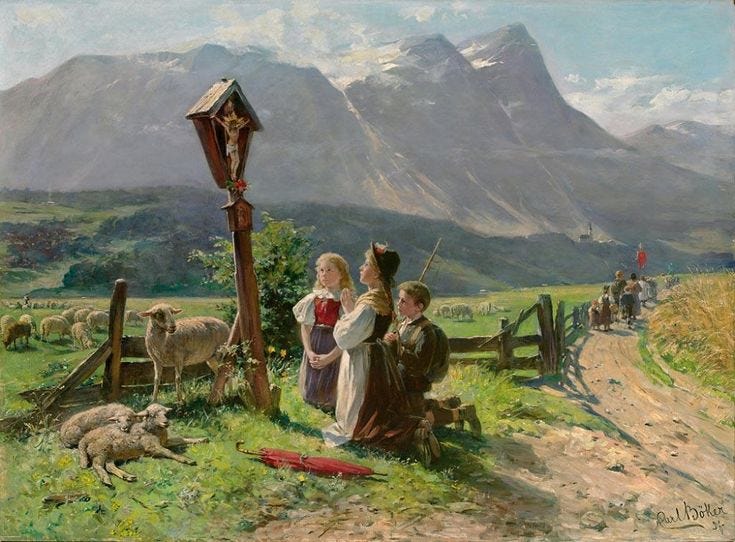
I super appreciate this. Thank you, Emily G!